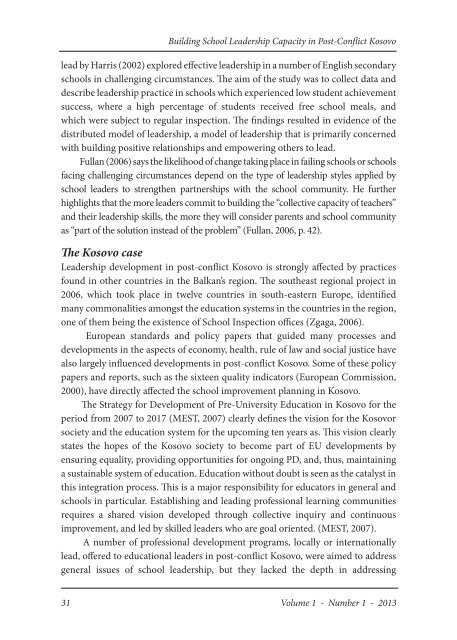Download - qendra per arsim demokratik
Download - qendra per arsim demokratik
Download - qendra per arsim demokratik
Create successful ePaper yourself
Turn your PDF publications into a flip-book with our unique Google optimized e-Paper software.
Building School Leadership Capacity in Post-Conflict Kosovolead by Harris (2002) explored effective leadership in a number of English secondaryschools in challenging circumstances. The aim of the study was to collect data anddescribe leadership practice in schools which ex<strong>per</strong>ienced low student achievementsuccess, where a high <strong>per</strong>centage of students received free school meals, andwhich were subject to regular inspection. The findings resulted in evidence of thedistributed model of leadership, a model of leadership that is primarily concernedwith building positive relationships and empowering others to lead.Fullan (2006) says the likelihood of change taking place in failing schools or schoolsfacing challenging circumstances depend on the type of leadership styles applied byschool leaders to strengthen partnerships with the school community. He furtherhighlights that the more leaders commit to building the “collective capacity of teachers”and their leadership skills, the more they will consider parents and school communityas “part of the solution instead of the problem” (Fullan, 2006, p. 42).The Kosovo caseLeadership development in post-conflict Kosovo is strongly affected by practicesfound in other countries in the Balkan’s region. The southeast regional project in2006, which took place in twelve countries in south-eastern Europe, identifiedmany commonalities amongst the education systems in the countries in the region,one of them being the existence of School Inspection offices (Zgaga, 2006).European standards and policy pa<strong>per</strong>s that guided many processes anddevelopments in the aspects of economy, health, rule of law and social justice havealso largely influenced developments in post-conflict Kosovo. Some of these policypa<strong>per</strong>s and reports, such as the sixteen quality indicators (European Commission,2000), have directly affected the school improvement planning in Kosovo.The Strategy for Development of Pre-University Education in Kosovo for the<strong>per</strong>iod from 2007 to 2017 (MEST, 2007) clearly defines the vision for the Kosovorsociety and the education system for the upcoming ten years as. This vision clearlystates the hopes of the Kosovo society to become part of EU developments byensuring equality, providing opportunities for ongoing PD, and, thus, maintaininga sustainable system of education. Education without doubt is seen as the catalyst inthis integration process. This is a major responsibility for educators in general andschools in particular. Establishing and leading professional learning communitiesrequires a shared vision developed through collective inquiry and continuousimprovement, and led by skilled leaders who are goal oriented. (MEST, 2007).A number of professional development programs, locally or internationallylead, offered to educational leaders in post-conflict Kosovo, were aimed to addressgeneral issues of school leadership, but they lacked the depth in addressing31Volume 1 - Number 1 - 2013


